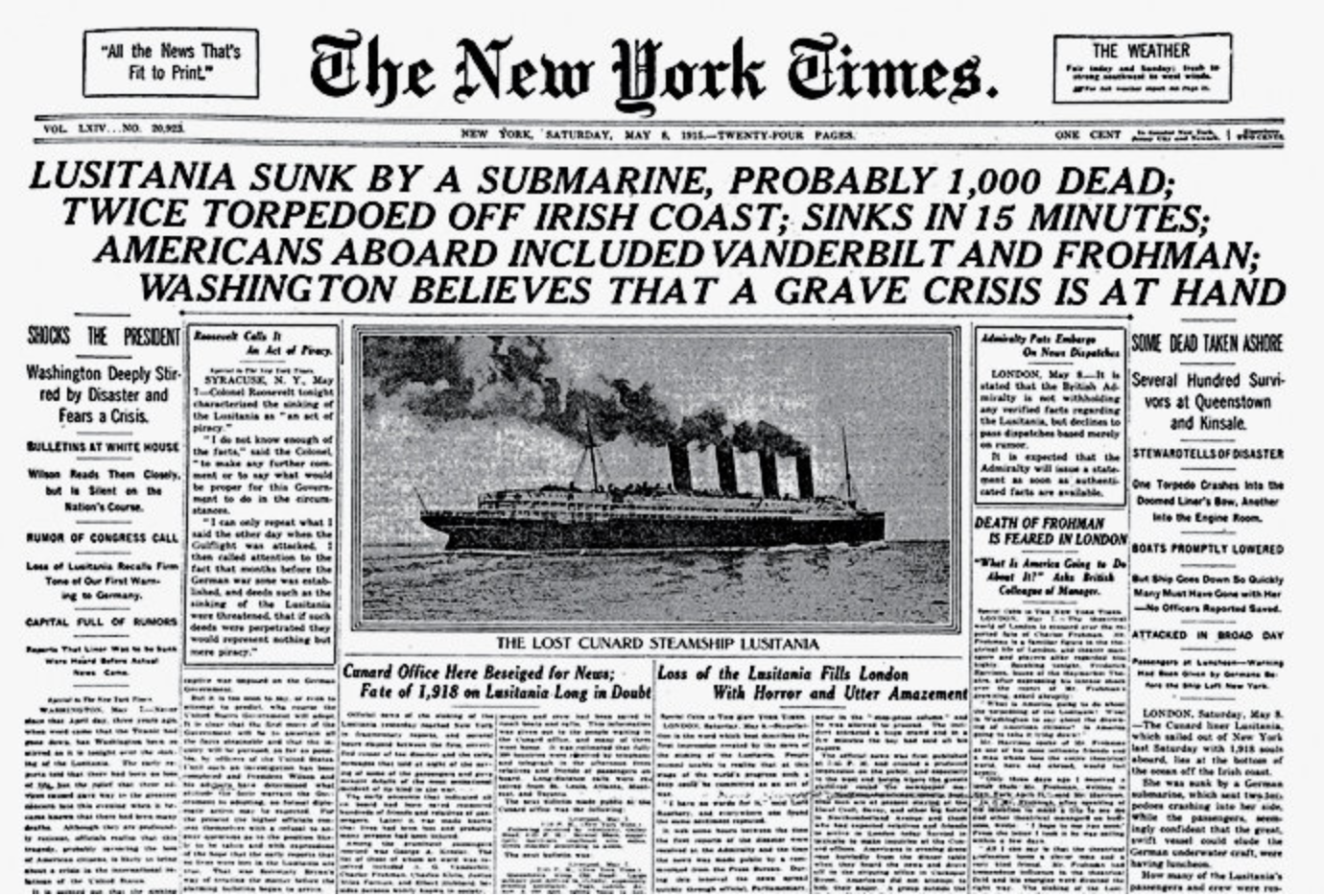by Greg King
As epic human tragedy the story has everything: a great ocean liner; a glittering cast of millionaires, actresses, suffragettes and scandalous lovers; and a terrible disaster played out over eighteen brutal minutes. On the afternoon of May 7, 1915, a German U-boat torpedoed Cunard’s Lusitania, leaving dead in the waters just off the Irish Coast. Even nine months into the Great War, this brutal act had the power to shock: an international outcry denounced Kaiser Wilhelm II’s Germany as a nation of murderers.

The New York Times on May 8, 1915, after the sinking of the Lusitania. Image is in the public domain via The New York Times.
Just three years earlier, Titanic had gone to the bottom of the Atlantic after her fatal encounter with an iceberg. Wrapped in an aura of romantic myth and self-sacrifice, Titanic became a Greek tragedy writ large, an event that seemed to presage all the horrors of the coming war. Lusitania, as we learned in researching and writing our book Lusitania: Triumph, Tragedy and the End of the Edwardian Era, offers something more brutal.
An unusually strong aura of potential danger surrounded Lusitania’s last voyage. Numerous passengers received warnings not to sail aboard her; the German Embassy placed notices in New York newspapers, practically signaling intent to attack if opportunity came; and nearly everyone knew that Lusitania would pass through a declared war zone, where German submarines had sunk a passenger liner just a month earlier. Yet most of those traveling aboard Lusitania ignored the potential danger, as if such an event was beyond the realm of possibility.
If the almost willful ignorance of passengers could be excused, the same doesn’t hold true for those in charge of the ship, especially the British Admiralty, which controlled Lusitania, and her captain, William Turner. Warnings to the Admiralty on Lusitania’s last voyage were clear, and just as clearly ignored. Nothing was done to alter the ship’s usual route, even though the waters off Ireland were the known hunting ground of German submarines. The Admiralty also knew that at least one U-boat was active off the Irish coast at the time Lusitania would travel; three vessels had been torpedoed here in the twenty-four hours before the tragedy. These circumstances should have heightened worries, and demanded a higher degree of caution over the ship. Yet the Admiralty provided no escort, and its warnings to Captain Turner that submarines lay along his route were perfunctory and outdated. When it came to Lusitania and her passengers, it is impossible to conclude that the Admiralty did all within its power to protect them from danger.
Even more startling was the discovery of Captain Turner’s negligence. In books over the last few decades, it has become fashionable to treat Turner as victim, a good-natured, crusty old salt who did his best when faced with disaster. Walther Schwieger, commander of the U-boat that loosed its torpedo on Lusitania, bears ultimate responsibility for his action, but Turner, too, shares blame for the loss of the 1,198 lives in his care.
Before the voyage he’d complained about the poor condition of many of Lusitania’s lifeboats, yet he never apparently bothered to personally inspect them before leaving New York and ensure that they were in good condition—an inexcusable lapse considering the danger to which his ship and those on it were to be exposed. He also knew that his crew was poorly trained and not proficient in handling the boats, yet he made no effort to provide them with additional instruction during the voyage. Numerous passengers came to Turner with worries about lifebelts and lifeboat drills; Turner angrily dismissed their concerns; later, he even lied about these encounters. And on the fatal day itself, Turner—obstinately convinced of his own judgment—ran his ship at a low speed, close to land, and in a straight line in contravention to direct orders he had received. His behavior was astonishing in its recklessness.
The real tragedy of Lusitania’s last voyage is that the great loss of life could easily have been avoided. After the fact, those in charge of Lusitania—and those most at fault—did indeed engage in a conspiracy surrounding her last voyage. But this wasn’t to hide exploding munitions or a plot to sink the ship and thus drive America into World War I. Instead, officials played the all-too-familiar game of concealing a lethal lack of diligence when it came Lusitania’s safety.
History cast the Titanic disaster as morality play, proof that man’s technological advancements were hollow against the forces of nature and the inexorable will of God. Lusitania, for all of its elements of tragedy, unfortunately reveals herself as an almost unbelievably stunning example of hubris.
GREG KING is the author of eleven internationally published works of history, specializing in late Imperial Russia and on social history. A frequent contributor and onscreen expert for historical documentaries, he serves as Editor-in-Chief of the bi-monthly European Royal History Journal, and his work has appeared in Majesty Magazine, Royalty Magazine, Royalty Digest, Atlantis Magazine, and the European Royal History Journal. His latest book is Lusitania.
